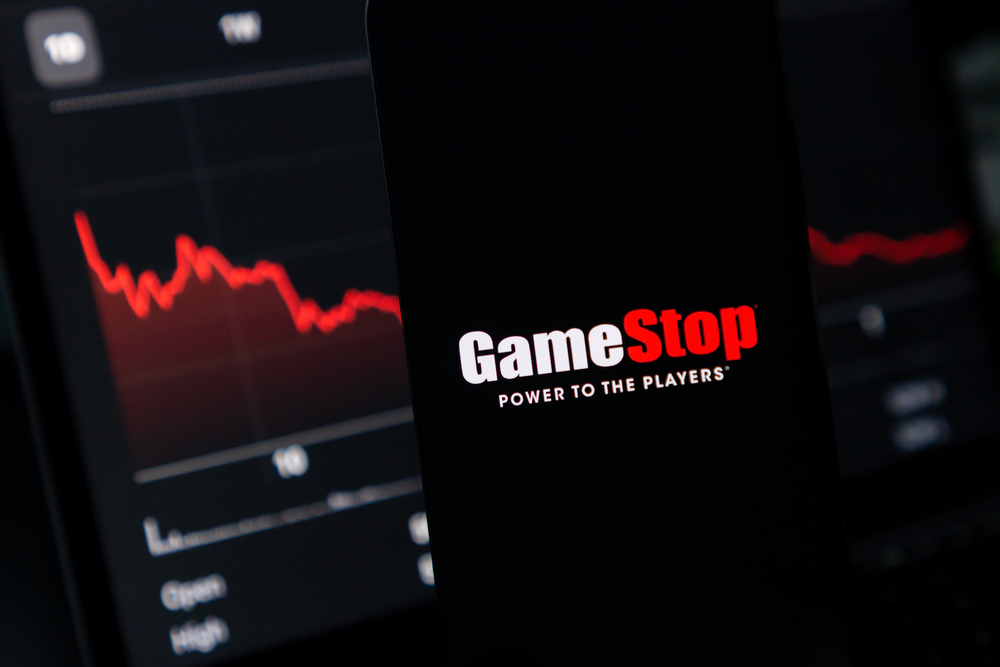I’m not going to see Dumb Money, the new movie about the January 2021 GameStop craze and the stock’s subsequent implosion.
I watched it unfold in real time – and warned readers that the stock was teed up to deliver maximum losses.
On January 28, 2021, I wrote a letter here titled “The Mind-Blowing Rise – and Upcoming Fall – of GameStop.”
The stock hit a high of $483 that day. It closed last Friday at $14.92 a share.
Yes, it’s history now. But there’s an important and enduring lesson here.
In January 2021, the fundamentals of GameStop – a struggling mall retailer of video games – were mediocre at best.
That was perfectly clear to anyone who looked at its books during the stock’s parabolic run higher.
The firm was losing money. Sales were declining at a 30% annual rate.
Yet individual investors on social media rabidly bought up the shares, forcing short sellers to cover and driving the stock higher still.
At the time, some characterized the phenomenal short squeeze as the triumph of the little guy over the big, bad wolves on Wall Street.
Hardly.
Yes, a few early traders got in and out quickly. (Although even these took an outsize risk.) Most lost their shirts.
A few cocky hedge fund managers – particularly the folks at Melvin Capital – also got their comeuppance, suffering multibillion-dollar losses.
As I watched the GameStop mania unfold, here’s what I told readers on January 28, 2021:
To say this will end badly is an understatement.
It’s often said that the market takes the stairs up and the elevator down.
But when this bubble pops, it won’t be an elevator ride. It will end like the last flight of the space shuttle Challenger.
And the young social media warriors who are high-fiving each other now will have an entirely different expression on their faces…
Trees don’t grow to the sky. And – despite the unbridled enthusiasm of some on social media – stocks don’t go to the moon either…
The bigger this bubble gets, the more inexperienced people will get hurt.
There is no way to justify the price of [this stock] based on fundamental measures of corporate value…
H.L. Mencken said, ‘Democracy is the theory that the common people know what they want, and deserve to get it good and hard.’
The same could be said of the punters furiously bidding GameStop and company higher.
You might imagine that folks caught up in a mania would be delighted and relieved to be forewarned about an upcoming collapse.
Not so. I was stepping on their baby.
Many of the comments posted beneath the column were so incendiary and profane that my editors had to take them down to avoid offending readers.
Folks continued to buy the struggling mall retailer even after the valuation was completely detached from reality… even after the company diluted shareholders with a massive secondary offering… even after insiders sold millions of dollars’ worth of their own shares… and even after the hedge funds and short sellers were long gone…
What were they thinking?
Were they thinking at all?
I don’t think the term “dumb money” adequately describes these investors.
Had they visited a GameStop lately? Did they see how old and faded the stores were? Did they notice how few customers were there?
Compare that with a visit to your local Apple store if you want to see night vs. day.
There are lessons to be learned here, including two big takeaways.
The first, as I mention here regularly, is to invest in the numbers not the narrative.
Experienced equity investors look at sales, earnings, margins, the health of the industry and the quality of the competition to analyze a company’s near- and long-term business prospects.
They don’t fall for “It’s going to the moon!” or “Buy forever. Sell never.”
That’s the language of hype.
The second takeaway? You have a much better chance of reaching your most important financial goals if you avoid the obvious minefields.
Like all investors, I’ve had my share of investments that didn’t pan out.
But I didn’t lose a dime in the dot-com bubble, the housing bubble, the meme stock bubble, the pot stock bubble, the NFT bubble or the crypto bubble.
Rather I went out of my way to warn investors about each.
Some listened. Others learned the hard way.
As an investor, you can’t avoid making mistakes. That’s not possible.
But the really stupid ones that blow up in your face? No one has to make those.
